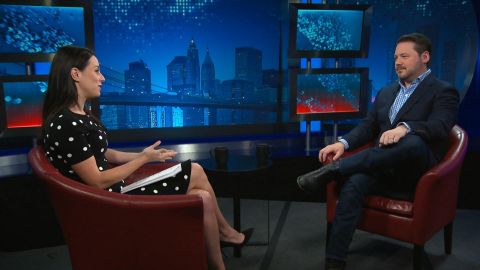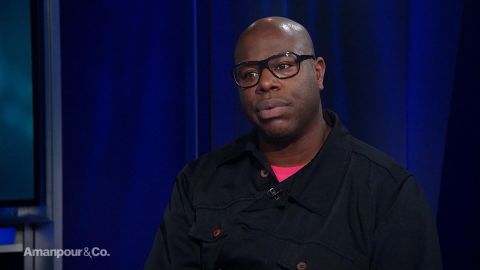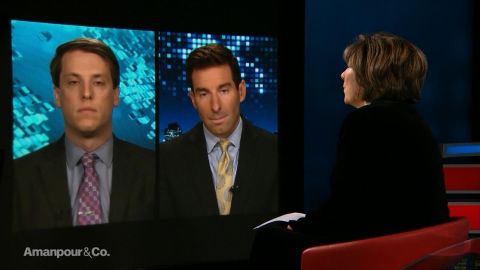Read Transcript EXPAND
ALICIA MENENDEZ, CONTRIBUTOR: Ben, thank you so much for joining us.
BEN DOMENECH, CO-FOUNDER AND PUBLISHER, THE FEDERALIST: Great to be with you.
MENENDEZ: So I’m going to start big picture. How would you describe the state of conservatism in the United States today?
DOMENECH: The conservatism has been trying to figure out its way ever since the end of the Cold War where you had this fusionist alliance between, you know, fiscal conservatives, social conservatives, and anticommunist, you know sort of pro-defense conservatives. That really broke apart over the past couple of decades. And while you had the, you know, sort of post 9/11 war on terror insulation against grip — coming to grips with that fact. I think that really the past couple of years have laid bare that without those sort of unifying characteristics, conservatism as a coalition doesn’t have as much strength within the Republican Party as you might expect. Instead, there’s a lot of other factors that play into it.
MENENDEZ: And so when you talk about those other factors, what are they?
DOMENECH: Well, I think a lot of it has to do with sort of a culture war mindset that looks to American tradition as a guiding light for what people want to see. And really I think that this has to do with the level of power that the baby boomer generation has had over American politics over the past couple of decades. I mean it’s incredibly bizarre that we’ve had three presidents all born in the same year. Donald Trump, Bill Clinton, and George W. Bush all born in the same year and all showing sort of different aspects of, frankly from my perspective, the failures of the baby boomer generation. Right now, if you’re a baby boomer, you’re someone who looks back at the times that you were a child in the 1950s and 1960s and you worry, your extreme concern that your grandchildren are not going to have a life that was better than your own. And because of that, it has this animating force of nostalgia for a time when jobs were more secure when you could come out of high school and have a job that would give you everything that you wanted in life really for the next several decades. And unfortunately, the Republican Party has embraced along with the elite of the Democratic Party a view of the benefits of globalization that really left out a lot of the people who felt sort of the negative effects of it in certain respects.
MENENDEZ: And in this landscape of American conservatism, where do you situate yourself?
DOMENECH: Oh, I don’t situate myself. I left the Republican Party in 2006 over the Iraq War and I haven’t voted for Republicans since I voted for my late father-in-law John McCain for the presidency. So I don’t consider myself a conservative. I think it’s more that I’m observing it more from the outside. I have more extreme views than that because I’m very libertarian.
MENENDEZ: Do you believe that President Trump represents a brand of conservatism?
DOMENECH: I think that President Trump is a transitional figure. It’s a question of whether he’s going to be a transformational one. In terms of figuring out the post-Cold War brand of conservatism, something that previously included a lot of suburban moderate Republicans. That’s something that I think Trump is sort of testing in a significant way. You know, maybe this is not the coalition that we want going forward. Maybe we want a coalition that can reach into union households that also supported Bernie Sanders in the 2016 primary in the Midwest. I mean one of the interesting dynamics of this midterm is that Trump and his phenomenon has essentially turned Ohio which used to be a swing state into a red state. Now, it’s also turned a number of other states that Republicans have previously wanted to target from purple states into blue. I would argue that Virginia is a blue state. I would argue that Virginia is a blue state. I would argue that Colorado is at best a purple state. We’ll see how Cory Gardner does there in his re-election. He’s sort of advocating an approach to politics that tests what conservatives wanted as their coalition and says no, we’re going to do it this way instead.
MENENDEZ: How do you think Democrats, as they are positioned to take over the House, how do they govern?
DOMENECH: It’s going to be impossible. I mean the reality is that we’re – – all we’re going to see for the next two years is going to be investigations and confirmations, confirmations in the Senate of the judicial pool of people that President Trump and his allies are continuing to push through. And then in the House, we’re going to see just all sorts of investigations, subpoenas, et cetera of every member of the Trump administration. There’s not going to be a lot of governance. The one interesting factor is going to be how President Trump approaches divided government. We saw this sort of crazy meeting this week about — with Nancy Pelosi and Chuck Schumer in the White House, the sort of on-air debate between them. I think that’s very much how President is going to approach things. I don’t think he likes the idea of backroom deals. I think he wants to have everything sort of out.
MENENDEZ: Because reality television is a medium he understands.
DOMENECH: Exactly. And he loves it.
MENENDEZ: Is that good governance?
DOMENECH: I don’t think it’s necessarily good governance but I don’t think that backroom deals have served people all that well either. You know in the sense that a lot of those deals end up in a situation where the people don’t actually get what they want. K Street gets what they want and you have all sorts of different goodies larded together in a bill that doesn’t necessarily serve the American people all that well. So is it different? Yes. Is it better? Maybe, maybe not. We’ll see.
MENENDEZ: You often write about global elites. How do you define that?
DOMENECH: People who are in charge. I mean it’s a simplistic way but I guess there’s — unfortunately, there’s this malleable definition that people have between elite and elitism. I don’t object to elitism in all sorts of different respects. But when it comes to the leadership class that we have, both in America and at a global level, I am concerned along with a lot of the people on the right and the left that we’ve reached a point where we are essentially credentialing our elites, that they are earning it in the form of proving their ability to lead in different respects. I mean George H.W. Bush’s passage is a good example of this just recently. This is someone who came to the presidency with one of the best resumes that you could possibly have in terms of the level of experience that he had had leading up to that presidency. I worry that the class of global elites that we have today include a lot of people who simply aren’t ready for the job. And I would include President Obama’s foreign policy circle in that number of people who, from my perspective, were woefully ill- equipped for the situation that was in front of them. And frankly, I have an objection to a lot of the people who are around President Trump who I think qualified with the same measure.
MENENDEZ: But your argument is bigger than government officials?
DOMENECH: Sure.
MENENDEZ: I want to read something you wrote. The implicit motto of the global elites today is no escape. No escape valve from a permanently politicized life where the only legitimate perspective is their monopolistic, secularized, authoritarian friendly, no gods but science view. When we do not view each other as legitimate, particularly when decisions are not coming from the people or properly elected officials but from some other force, it leads to resentment, escalation, and eventually something much worse. What is that other force?
DOMENECH: I — well, I think that in this sense, I’m talking there about the elites of Silicon Valley. In response to what we’ve seen from — let me take a step back. The president is fond of using this term enemy of the people when it comes to the “fake news media”. Now, I don’t approve of that. I don’t think that Jim Acosta is an enemy of the American people. I find him a little bit ludicrous personally but I just think that the press as an entity is not the enemy of the American people. However, the most powerful media entities in the country today are not the newspapers, they’re not the T.V. networks, they’re not CNN, they’re not “The New York Times”, they are Silicon Valley. Facebook and Google are the most powerful media entities in America today. And they are if you’re not–
MENENDEZ: In which way do you mean that?
DOMENECH: I mean that they are the forces that spread news. They spread it more widely. Facebook functions essentially as a replacement for the entirety of local media in America. And having sat down with these individuals, having talked to them, the fact is that if they’re not the enemy of the American people, they are the enemy of free thought. They do not believe in free thought taking precedence over the negative P.R. that they might receive for expanding upon it. Google’s partnership with China should be one of the biggest concerns that we have as a country today because it shows their willingness to bend the need to authoritarian regimes, secular regimes that want to stamp out free thought that has, just this past week, jailed Protestant pastors, have reached out in ways that are extremely dangerous and concerning. And the fact that we have an American company that’s willing to engage in this type of behavior, to assist them in this type of regime should be of the utmost concern to us.
MENENDEZ: So do you think regulation then is the answer?
DOMENECH: I don’t think that regulation is necessarily the answer because I think that will always be chasing the tail there. I think my big concern about them is that in this current environment, they’ve wanted to have it both ways. They’ve wanted to pretend like they’re not members of the media, that they’re simply platforms, whatever that means for all of this different talk, and that they don’t have to deal with any of the consequences of it. They don’t have to deal with the consequences of death threats that are posted on their platforms, of all the negative effects that they have had when it comes to their willingness to be — to look the other way when they’re being used by foreign entities to mess with our elections. This is something that I think should be at the center of the American conversation. The unfortunate situation is that because of the way the 2016 election played out, this can’t be something that is as bipartisan as it should be. Now, maybe that’s changing —
MENENDEZ: Do you think that they’re responsible for some of the tribalism [13:50:00] we’re seeing today?
DOMENECH: Unquestionably. I mean the assumption — look, these are engineers. They’re not people who are social scientists. They didn’t necessarily expect the products that they were creating to have this kind of impact on people’s lives but they have had this impact. They have worked on the whole conversation that we’re having in America today. They’re having extremely negative consequences, measurable negative consequences.
MENENDEZ: So if not regulation, then how do you fix it?
DOMENECH: I’m not sure that there’s an easy fix because I think it’s proper — I think is profoundly cultural. I think that at the end of the day, these are a group of people who didn’t realize who they were having in the room. I mean I’ve had conversations with Mark Zuckerberg about this. And I think that the fact of the matter is that he really didn’t know what was going on in terms of his own creation in this last election. In the same way, I think that he’s only right now coming to grips with the effect that it’s had on the way that people really live their lives. And that’s a hard thing to do when you create something that’s enormously popular, that lots of people get involved in, that they use the platform every day, that they go to as their home page. You don’t necessarily want to think about all the different negative aspects of what’s being done and how it’s being used, how it’s having an impact on people’s lives.
MENENDEZ: It strikes me that when I ask you about governance, when I ask you about the role of global elites, when I ask you about tech, a lot of your answers go back to this fundamental question of culture.
DOMENECH: Yes.
MENENDEZ: What then?
DOMENECH: Well, I think all politics is downstream from culture. I think that the culture of a country is — particularly, the culture of our representative democracy is far more important than any of the different levers that we can pull knobs that we can turn. Getting back to sort of the question that you asked before about global elites, to a certain extent, I think the answer is we’re always going to have elites. We need to have a better classism. I think that it’s actually a very good thing that within this past midterm election — let’s just consider two people as an example. You had the election of Alexandria Ocasio-Cortez here in New York who is — someone who comes from the more Bernie Sanders School of American democratic socialism, who wants to push the envelope in a lot of different respects when it comes to policy. She’s a charismatic figure who can use social media to great effect. I think her presence in the U.S. Congress is a good thing. I also think it’s a good thing that we have someone like Dan Crenshaw from Texas who became more notable because of the fact that Saturday Night Live made fun of him. But here’s someone who is an actual veteran of the wars that we’ve been fighting around the world for the last 17 years who’s coming to the Congress with the potential to grow into someone who can change the path of American foreign policy going forward. We need to rid ourselves of a generation of leadership that has redistributed to themselves more than any other generation that has worked our conversation with a form of false nostalgia that has engaged in a lot of behavior that I think we can in retrospect sort of deem unwise at best. And from my perspective, that’s something that needs to happen sooner rather than later.
MENENDEZ: When you look at France, the protests, Macron, I think some would call capitulation.
DOMENECH: Yes.
MENENDEZ: You have Brexit outright failing. Where does that leave the state of European politics?
DOMENECH: I think the real threat here is that Europe’s flux disarray, what have you, is happening at a moment in which there is not a clear guiding light of American foreign policy to show what our attitude is going to be towards this entire problem. Now, I understand the appeal of a lot of these different populist, nationalist sentiments and a lot of these countries. Frankly, they have more history there than they do here. But I do think that there’s a real lacking of a clear American vision of what we want Europe to look like going forward and that’s dangerous. I mean the whole point here is that we as a force for foreign policy engagement in the world have time and again had these relationships prevent the need for greater military presence or investment in various parts of the world. The lack of that is something that I think is very concerning.
MENENDEZ: Ben, thank you so much.
DOMENECH: Great to be with you.
About This Episode EXPAND
Christiane Amanpour speaks with Garrett Graff & Elie Honig about what the latest bombshells mean for the President; and director Steve McQueen about his latest film, “Widows.” Alicia Menendez speaks with Ben Domenech, Co-founder and Publisher of The Federalist, about turning his back on the Republican Party.
LEARN MORE


